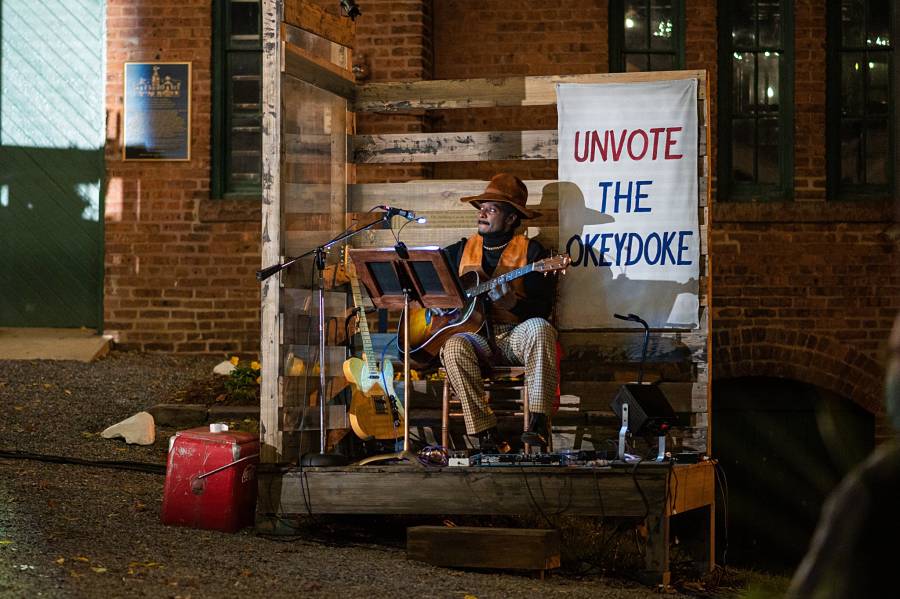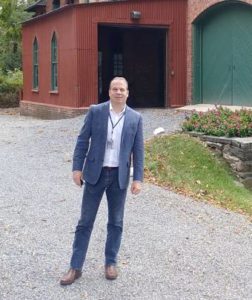When planning a full season of shows for Premiere Stages at Kean University in Union, N.J., artistic director John Wooten (he/him) typically submits a four-page proposal to Actors’ Equity Association. But for a single recent production of Fannie Lou Hamer, Speak On It!—staged outdoors just five times with two performers for relatively small, socially distanced and masked audiences—Wooten “went back and forth 15 times” with the stage actors’ union, filling up a safety worksheet with a “multicolored rainbow” of highlights of concerns and solutions, for a document that ended up close to 30 pages.
“I understand Equity’s position—they need to protect their members at all costs,” said Wooten. Those costs, it turns out, were ultimately manageable for Premiere Stages, due to a confluence of factors: having a campus COVID-19 protocol and housing infrastructure in place, as well as a flexible outdoor performance space on the university grounds, at the Liberty Hall Museum, and enough money in the budget from shows they weren’t producing due to the pandemic lockdown.
Of course, it might have been cheaper, not to mention less of a headache, to produce nothing at all. But when Wooten heard about Cheryl West’s play about the 1960s Civil Rights icon, commissioned by Chicago’s Goodman Theatre for their mainstage but recently condensed by West into a brief, portable version specifically for adaptability to our small-gathering present, he saw the chance to stage a timely election-themed event; the show highlights both the brutal racism that Hamer and her generation faced, as well as the price they paid for the contested right to vote.
This leap of faith was not without its share of motion sickness.
“It was all a little surreal, from the moment I decided to do the play to the final Q&A question,” Wooten confessed after the closing performance, which I attended with my family on Sun., Oct. 18—my and their sole in-person theatre outing since March (and likely for the foreseeable future). “The whole time we were working on it, I would wake up feeling like Icarus and wondering if my wings were going to melt. But it was worth all the hurdles.”
As the nation heads into a winter COVID surge that shows no sign of abating, even as promising news of vaccines offers a light at the tunnel’s end, theatres across the country are trying all kinds of alternatives, from drive-in performances to Zoom plays, storefront tours to solo installations, to keep artists employed and audiences engaged. A little more than a dozen theatres have managed to mount in-person performances with the union’s approval (and anecdotally, non-Equity theatres that have ignored health protocols have not fared well), and a few that have announced in-person performances for early 2021 are very much in “pending,” if not outright aspirational mode.

Premiere Stages’ example—and that of the Goodman, which also staged Fannie Lou Hamer, though in their case with a truck taking it to various Chicago parks—might prove instructive, or cautionary, depending on your perspective.
The Goodman’s process began in June, when the show’s original director, Henry Godinez, had the notion of putting the show on a truck, a la Luis Valdez’s El Teatro Campesino. The theatre asked West to adapt the play for the purpose, and she obliged, and then enlisted the cooperation of Chicago’s Park District and arts and culture department. Their plan to do nine performances at nine separate parks, hitting “every neighborhood in Chicago,” according to Goodman executive director Roche Schulfer (he/him), was a success in late September and early October, though they hit one snag along the way: a postponement due to a positive COVID test. As Schulfer explained, “It was not anyone in the cast, but someone among the 15 or so people supporting the project.” Performances were delayed for a week, resuming only when a negative test came back. Schulfer noted that the Chicago limit on gatherings of more than 50 people, masked and socially distanced, was overcome in a sense by the “perimeter viewing beyond the 50-seat restricted area, so that hundreds of people were able to see it.”
The performance I and my family saw in New Jersey had audiences spread on benches and chairs facing the historic carriage house of the Liberty House Museum, where Rema Webb, playing Hamer, mounted a runway and gave a stump speech that morphed into a personal monologue of her harrowing years as an activist, accompanied by a live guitarist, Kena Anae. Audience sizes were capped at 75, said Wooten; the one I attended looked a bit smaller than that. I will only add that it was both eerily familiar and blessedly strange to be sitting in a theatre audience again. The show and the performers were wonderful on their own terms, but I was a bit distracted by the whole experience. I think it will take some time for me to reacclimate myself to this activity, once so central and now so alien to my life.

Afterward, Wooten filled me in about the backstage protocols that made the staging possible. His work began in August, after he got the rights to West’s play and sent a proposal both to Kean University and Equity. His initial casting notice said “pending approval,” and he told his team—which included the actors, designers, and director Marshall Jones III—that if Equity didn’t end up greenlighting the production, he would pay them for the work they’d already done up to that point. When he did get approval, the work began in earnest: He had to quarantine the actors in housing provided by the theatre, and pay for them to get tested “an average of every three to five days; they had to have to two negative results before they could rehearse.” Rehearsals began on Zoom, then moved to the outdoor museum grounds.
Luckily, there was “extended stay” housing at the university at a negotiable price—and crucially, it had state-of-the-art ventilation. Wooten stressed this as advice for others who want to do Equity-approved productions. “Actors cannot be in buildings unless there’s the highest level of filters and ventilation, so make sure that your venues are new enough” that they’ll pass the union’s high bar, he said.
The theatre’s press rep, Christina Hoffman, was deputized as the production’s safety coordinator. “She was the only one allowed to drive the actors anywhere, and to help them with microphones, wigs, etc.,” said Wooten. “She was our superhero—she literally had eight different jobs. She probably spent 30 to 40 hours researching testing sites and shuttling them back and forth.”
Despite the extra hassle, Wooten said he would consider doing more events along these lines. The Goodman’s Schulfer sounded similarly sanguine. “It was certainly successful—it reached hundreds of people, it was a pretty high-profile event, got media and TV and radio coverage,” he said. “It’s in line with what we try to do in working with communities. We’ve talked about projects with the Park District a lot over the course of time, and we’re optimistic that this is a program we could replicate.”
Perhaps not right away, though. As Schulfer conceded, “I’m not sure we’d get permission to do it now, given local conditions.” Likewise, a month after the run of Fannie Lou Hamer, Kean University has gone fully remote because of the rise of COVID-19 cases in the area. Though he sounded eager to build on this experiment for future programming, in recalling this production process, Wooten offered what may have to be the motto for theatres everywhere in the uncertain coming year: “We were prepared at any minute to pull the plug.”


